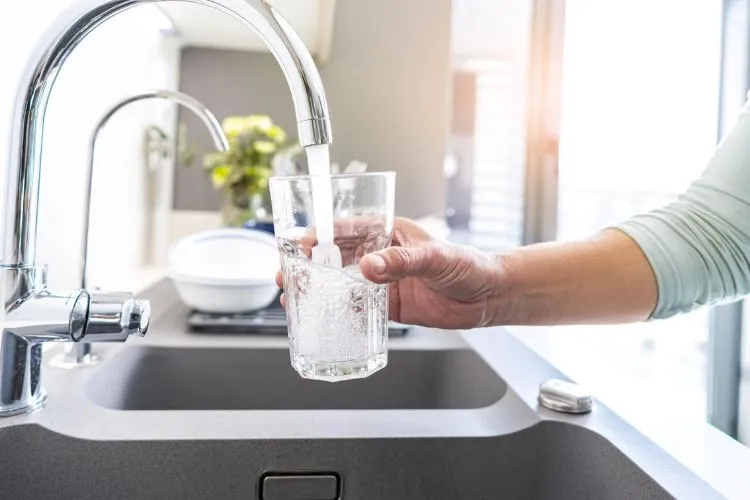Water quality is a crucial aspect of daily life that affects everything from the health of our appliances to our personal comfort and hygiene.
In urban settings, the question of water quality often arises, with one of the main concerns being water hardness.
Philadelphia, a vibrant city with a broad history and diverse population, is no stranger to this issue.
So, does Philadelphia have hard water?
This article dives deep into the understanding of water hardness, its impact, and specifically, the hardness of water in Philadelphia.

💦 Understanding Water Hardness
Water hardness comes from minerals like calcium and magnesium. When these minerals are high in concentration, water becomes “hard.” Experts measure hardness in milligrams per liter (mg/L) or grains per gallon (GPG).
Hard water affects many aspects of daily life. It can cause build-up in pipes, reduce the effectiveness of soap, and even impact one’s skin and hair.
Over time, appliances like washing machines and water heaters can suffer.
💦 Does Philadelphia Have Hard Water?
The city of Philadelphia gets its water mainly from the Delaware and Schuylkill rivers. The water from these sources then undergoes treatment before reaching homes and businesses.
When it comes to hardness, Philadelphia’s water generally falls into the moderately hard category. This classification is based on standard hardness measures, which compare the levels of calcium carbonate in water.
Data suggest that the average hardness of Philadelphia’s water varies but remains within a range considered acceptable by most standards.
However, it’s important to note that water hardness can fluctuate due to several factors. These include changes in the water source and variations in the treatment process.
💦 Factors Affecting Water Hardness in Philadelphia
Geographical and environmental factors play a significant role in the hardness of the water in Philadelphia.
The minerals found in the soil and rocks around the Delaware and Schuylkill rivers seep into the water, affecting its mineral content and hence, its hardness.
These levels might also shift with seasonal changes or due to human activity affecting water sources.

💦 Treatment and Management of Hard Water in Philadelphia
Philadelphia treats its water using various processes to ensure it is safe and to manage its hardness. This treatment includes adding substances that help soften the water or reduce the concentration of minerals.
Yet, some residents might still notice signs of hard water in their homes. For those facing hard water issues, installing a water softener or using specialized water filters can offer relief. These home solutions improve water quality for drinking, bathing, and cleaning.
💦 Government Standards and Recommendations
Local regulations in Philadelphia follow the guidelines set by national entities, such as the Environmental Protection Agency (EPA), regarding water hardness.
These standards ensure that the water is not only safe but also meets the expected quality for daily use. Philadelphia’s water authorities work hard to stay within these guidelines, frequently testing the water and adjusting treatment processes as necessary.
💦 Pro Tips
Detecting hard water at home can be as simple as looking for signs like mineral build-up around faucets or feeling a film on your hands after washing them. For those who want to be sure, water testing kits are available.
Once you know you have hard water, choosing the right water softener is crucial. Consider the size of your household and the specific hardness level of your water.
To prevent problems associated with hard water, regular maintenance of your water-using appliances and plumbing is advisable.

💦 Case Studies: Before and After
In Philadelphia, real-life stories from residents reveal the transformative impact of managing hard water issues.
One notable case involves the Thompson family in a suburban part of the city, who struggled with scale buildup on their appliances and fixtures, a common sign of hard water.
They invested in a high-quality water softener system, adopting a solution that directly addressed the high mineral content. Within months, the difference was stark: their appliances operated more efficiently, and the persistent scale and scum vanished.
This shift not only improved their daily water use experience but also extended the lifespan of their appliances.
Their strategy showcases the tangible benefits of proactive water management, inspiring others in similar situations to explore tailored solutions for hard water challenges.
💦 Frequently Asked Questions (FAQs)
What is considered “hard” in terms of water hardness levels?
Water hardness is measured in milligrams per liter (mg/L) or grains per gallon (GPG). Hard water typically starts at 120 mg/L or 7 GPG and above.
How often should Philadelphia residents check their water for hardness?
Testing every two years is a good practice, but annually is better, especially if you’ve previously had issues with water hardness or if your area is known for hard water.
Are there any health risks associated with using hard water?
Generally, hard water is not harmful to health. In some cases, the extra minerals can even be beneficial. The primary concerns with hard water are more about appliance longevity, cleaning effectiveness, and skin and hair health.
Can I use regular soap and detergents in hard water?
You can, but hard water may reduce their effectiveness. Special detergents and soaps designed for hard water are available and might provide better results.
What are the signs that my home has hard water?
Common signs include mineral buildup around faucets and pipes, spotting on dishes and glasses after washing, reduced foaming and cleaning effectiveness of soaps and detergents, and sometimes a filmy feeling on the skin after bathing.
Conclusion:
Philadelphia’s water falls into the moderately hard category. While this may not pose significant issues, knowing how to manage and treat hard water can make a big difference.
From household tips to understanding the treatment processes the city employs, being informed is key.
Water hardness in Philadelphia is a manageable concern, and with the right tools and knowledge, residents can ensure their water quality is optimal.

Devon Shorts, a seasoned expert with over a decade of experience in water safety, shares valuable insights on this blog “Aqua Safety Plus”. Trust his expertise to keep your water clean and your family safe.
